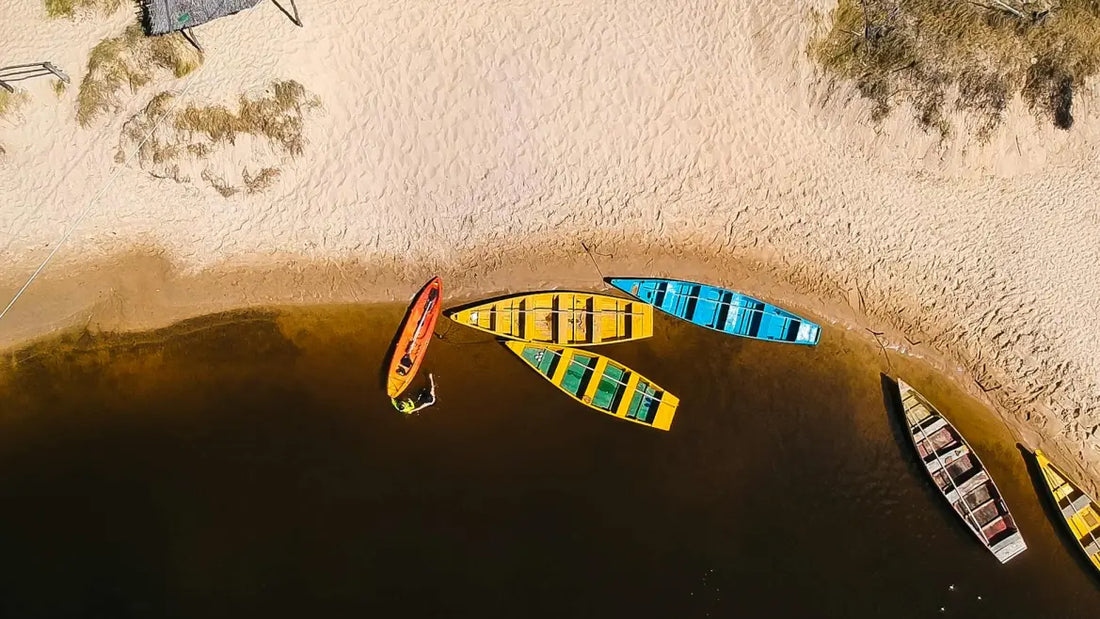
Green Journeys: Enjoying Sustainable Adventures
Share
The allure of travel often lies in the beauty of our natural surroundings—be it serene beaches, enchanting forests, or vibrant coral reefs. However, the impact of tourism on these ecosystems can be significant, contributing to increased water and energy consumption, land degradation, and disruption of local wildlife.
The emissions from transportation further add to the ecological footprint. It's crucial to recognize that tourism itself isn't inherently harmful; rather, the damage comes from how we approach it. In this blog, we embark on a journey to explore the positive changes we can make. From embracing eco-tourism to fostering education, we delve into how adopting eco-friendly travel practices can play a pivotal role in preserving the natural wonders we love to explore. Join us on this blog towards sustainable adventures and responsible journeys.
Eco-Conscious Transportation for Your Sustainable Adventures
As we venture into the realm of sustainable travel, it's essential to extend the eco-conscious practices we embrace in our daily lives to our holiday adventures. Transportation is a significant contributor to our carbon footprint and therefore holds immense potential for positive change.
From opting for public transport and embracing cycling or walking to exploring the possibilities of electric and hybrid vehicles, let's discover how aligning our travel choices with our sustainability values can make a substantial impact on the ecological footprint of our journeys. If you are interested in the environmental impact of travel, the World Tourism Organisation has prepared a report that you can access here.
1 Public Transport
Embarking on sustainable journeys often starts with the simple choice of opting for public transport. Take a closer look at the public transport networks in your destination; you might be pleasantly surprised by special travel deals tailored for visitors. Beyond the obvious economic perks, embracing public transport aligns with our commitment to environmental well-being.
Shockingly, in Europe, 500,000 premature deaths annually are attributed to air pollution, a concern that doesn't take a vacation. By choosing buses, trains, or trams, we not only contribute to cleaner air but also play a part in reducing noise pollution. So, before you consider renting that scooter, why not explore the local area on a more sustainable and community-friendly mode of transport? It's a win-win for you and the planet.
2 Cycling and Walking
Say goodbye to traffic jams and hello to a greener, healthier way of exploring—by choosing cycling and walking. Not only do they spare you the frustration of being stuck in traffic, but they also contribute to your well-being. Cycling and walking are eco-friendly and fantastic for your health. By opting for these modes of travel, you actively reduce the emissions associated with traditional transportation.

Did you know that up to 15% of motorized trips under 5 km can easily be swapped for cycling or walking? Consider renting a bike or taking a stroll during your stay. It's not just a mode of transport; it's an opportunity to immerse yourself in the surroundings, embracing the sights and sounds of your destination without the confines of a motor vehicle.
3 Electric and Hybrid Vehicles
When traditional modes of transportation are a must, consider making your journey eco-friendly by opting for electric or hybrid vehicles. In areas where other options are limited, choosing electric or hybrid options significantly reduces dependence on fossil fuels. These vehicles not only contribute to a cleaner atmosphere but also play a part in reducing noise pollution.
So, if four wheels are a necessity, let them drive you towards a more sustainable and quieter adventure. If you want to learn about sustainability and transportation in more detail, check out this other article.
Check out Green Accommodation Choices
Just a few years ago, the term "green" or "sustainable" accommodation was hard to come by, but nowadays is much easier to find these alternatives, which btw, go a long way in sustaining the positive impact of your journey.
When considering eco-friendly hotels, keep an eye out for signs of commitment to energy efficiency and water conservation on their websites. A crucial aspect of responsible stay is being mindful of water usage. Many hotels implement systems to prevent unnecessary laundering of towels and bed sheets, so if the information is not displayed, don't hesitate to ask the staff about these initiatives.
Many hotels expand their eco-friendly offerings to organic food, rental of bicycles and natural health and relaxation treatments so we can enjoy a 360 positive experience.

For those seeking a more direct connection with nature, camping is a great alternative.
Remember the golden rule of camping: leave no trace.
Ensure you clean up after yourself, respecting the environment you've chosen to be a part of during your stay. It's not just about where you sleep; it's about reducing your impact on the places you visit, by reducing the waste you generate.
For example, you can carry reusable drinking Steel bottles. Also instead of using single-use plates or containers, camping enthusiasts can use durable equipment like these Stainless Steel Bao Bowls which are reusable and perfect for outdoor eating!
Mindful Activities and Excursions for Sustainable Adventures
Engaging in mindful activities and excursions can transform your travel experience into a positive force for the environment. Opt for nature-centric activities, such as hiking, bird watching, or exploring botanical gardens, so you can immerse yourself in the surroundings.
For wildlife enthusiasts, you may need to look around for ethical wildlife encounters and responsible tours that promote conservation efforts. By selecting activities that align with eco-friendly principles, you not only create lasting memories but also become a steward for the preservation of the destinations you explore. A real win-win!
Local Dining
Eating fresh, local food is a great way to learn about your travel destination. Beyond tantalizing your taste buds, opting for local cuisine significantly reduces the carbon footprint associated with food transportation. Indulge in dishes that showcase the region's unique flavours and ingredients, providing an authentic culinary experience while contributing to the local economy.
If you are travelling on a budget or don't have much time, here is our HOT ECO TIP. Check if food rescue apps like Too Good To Go operate in the area you're staying. These apps offer an opportunity to rescue surplus food from local eateries, preventing it from ending in landfills. It's not just a cheap meal; it's a chance to savour sustainability and engage with the heart of the local culture.
Local Culture and Communities | The Human Side of Sustainable Adventures
Of course, doing something educational can also be a fun way of ecotourism. By visiting the historical landmarks, museums, or cultural centres, you can learn more about the local history. And in turn, it can foster an appreciation for the regional traditions and community.
Immerse yourself in the richness of your destination by honouring local customs and traditions. Show your respect by cleaning up after yourself, leaving the places you visit as beautiful as you found them. If the opportunity arises, lend your support to local initiatives that aim to preserve the cultural heritage and environment. You can also engage with the community by supporting local businesses and choosing products made by local artisans.
Packing Light and Smart
Travel experts will tell you that when it comes to luggage, less is "definitely" more. And we cannot but agree! The last thing you want is to stress yourself dragging around a huge suitcase or a heavy backpack. So, if you are not going away for long, small, lighter bags can be a much better option.
Simplify your travel experience by embracing reusable and sustainable travel items, for your convenience but for the benefit of the environment. For example, if you take a reusable water bottle with you, you will minimize single-use plastic waste and stay hydrated throughout your journey. You can save a bit of money too, if you refill it at your hotel or in public fountains.
You can also opt for eco-friendly toiletries. From plastic-free solid soaps and shampoos that can be carried in the hand luggage during your flight, to a light bamboo toothbrush, or a natural anti-mosquito oil, there are plenty of great sustainable alternatives.
You can also use a durable, reusable shopping bag for your local grocery shopping or to carry souvenirs, lessening the demand for disposable options. By packing reusable essentials like utensils and a travel mug, you contribute to the reduction of single-use plastics, promoting a cleaner and greener environment.
Implementing just a few of these environmentally conscious choices to transform your travel routine into a journey that leaves a lasting positive footprint.
Ready to embrace Green Traveling?
Every time we travel, we can make a big difference for our planet! It's all about making simple but awesome choices like using eco-friendly transportation, picking green places to stay, doing mindful stuff, and supporting local vibes. When we bring sustainability into our adventures, we're turning our trips into good vibes for the Earth. So, it's not about giving up the fun of exploring – it's about making it even cooler by caring for the places we visit.
Be an awesome explorer and give these ideas a shot! 🌍✈️

Hi, I’m Pablo Diez de Baldeon, a sustainability enthusiast from Spain. On my home island of Gran Canaria, I grew up in close contact with nature and the outdoors on the coast and the mountains. I’ve always been drawn to sustainability, it inspired me to pursue studies in this area to have a positive impact!




